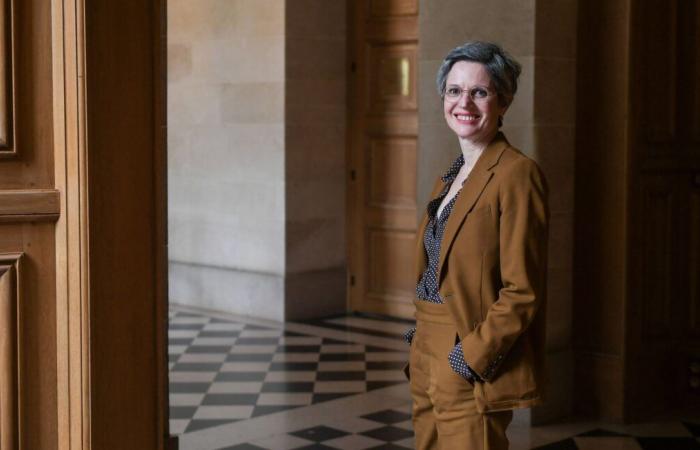
It is a call for radicalism, but also a desire to wipe the slate clean of part of the past in order to move forward. In his latest book, What Drives Us – How We Can Avoid Catastrophe (Le Seuil), to be published tomorrow, Sandrine Rousseau undertakes a perilous exercise. That of putting back in its place a reality that is still largely fantasized today: that of the Thirty Glorious Years, its full employment and its social advances.
“However, I owe them a lot to the Trente Glorieuses!” she assures, as if to protect herself from potential attacks. Nevertheless, the Green MP affirms: it is now time to deconstruct the myth, to make way for a more optimistic vision of a possibly better and more desirable future.
In your book, you chose to compare the era of the Trente Glorieuses with the current world. Why did you want to do this precisely now?
Because I find, precisely, that we are still completely locked in this period of the Thirty Glorious Years. There is a form of confinement, of imprisonment in this model that we would like to find again and which remains THE reference. Even today, we condition the financing of the social system on growth. Except that the whole problem comes from there! And as long as we do not become aware of it, we will not succeed in thinking differently.
Wasn’t the Thirty Glorious Years ultimately a breaking point?
The Thirty Glorious Years are neither viewed objectively nor serenely. They were years of monopolizing nature, of transforming nature into an object, of massive artificializations… And they were also years when we did not think about “limits”, and when we did not think about “resources” either. When we talk about the Thirty Glorious Years, we also do not think about the place of women. We do not think about the place of immigrants who lived, for many, in slums. So in fact, the Thirty Glorious Years is a very biased way of looking at our history.
However, these years were socially very rich…
We should take stock of the imprudence of these Thirty Glorious Years. Yes, we had paid vacations and cars, and that gave us freedom, that’s undeniable. Yes, we had washing machines and that gave us freedom, that’s undeniable. But we ended up losing sight of the fact that the economic system was only a tool with a social objective above all. And today, we have lost control over this system. It is completely beyond our control. It’s a bit like the Pac-Man game where we get “eaten” by the system.
You criticize the left quite a bit, especially by writing that it does not fully fulfill its role. What role are you talking about?
I say above all that she is herself a prisoner of this period. I was very surprised when I saw the program of the New Popular Front, in which I did not participate. It notably talks about recovery through consumption, low wages… We did not invent anything! So ok, we mixed it with ecology and other things. But in the end, we also remained prisoners of this reading grid.
And I think that the left will not win as long as it continues to offer a monochrome that others also offer.
You claim that the French are actually more open and tolerant than we think. Like the opening ceremony of the Olympic Games?
This opening ceremony of the Olympic Games really left a mark on me. Through it, Thomas Jolly showed the world that gender identities were changing, that women had their place in history, that a black woman could sing the Marseillaise and that it was sublime. It was as if all these invisible movements suddenly burst out in the face of the world. It did me a world of good! And then, there was this kind of far-right microcosm that forced us into the violence of debate.
But the public and political debate is not at all revealing of what is happening in society. Because in reality, we are ready. We are ready for the ecological transformation, we are ready for a society without domination, we are ready for a society without violence. We are ready to change!
But according to you, only a part of the French would be ready for change. What do we do with the others?
If we take the example of eco-friendly actions, in fact, everyone has started doing it. Simply, what we all do is what is simplest, like sorting our waste or taking public transport when we can. What is missing to go further is the establishment of real public policies.
Like during the Thirty Glorious Years?
Exactly. During the Trente Glorieuses, ambitious social policies were put in place. But not ecological ones. Today, we need to find a collective spirit, but with ecology at the heart of public policies. Because on global warming, we are in an extremely serious situation. Our entire economy should now be centered on how we protect ourselves. But this is still not the case because we are still looking for growth like we are looking for the dahu…
For you, the social elevator would be broken. You even go so far as to speak of downgrading. Isn’t that, ultimately, the evil of our century?
The Trente Glorieuses was a period when everything was possible. My grandfather, for example, was a farm boy at the age of 12, wounded in the war and then a shoemaker. Of my four grandparents, only one had a school leaving certificate. Which is incredible, since in the following generations, there were researchers! These were real social opportunities.
Today, there is not only social determinism, but there is also a monopolization of merit. And those who are in the best families monopolize merit. For me, that is really a tool of domination. I find that there is a monopolization, by the rich, of social and ecological merit. Those who travel by bike, for example, it is because they can do it. They live in the city, are in good health… What about the others? Today, there is a social confinement, a social determinism and a downgrading that is increasing considerably.
Could this downgrading be one of the reasons for the rise of nationalism and masculinism in France?
Yes, because if we don’t find pride in what our children are going to do, or if we don’t find pride or meaning in the work we produce, then we’re going to look for pride elsewhere. In the fact of being French, or in the fact of being a guy with big muscles, for example.
France has been without a government for more than 50 days. A record. What does this political sequence say about our times?
It says that Emmanuel Macron is afraid of his people and his times. And he played with the French in a way that I find a little sadistic.
What is your response to those who have denounced a “denial of democracy” following the appointment of Michel Barnier as Prime Minister?
The whole problem with democracy is that it must be understood as representative. For it to work, the people must have confidence in the fact that they are represented. And there, I think that if you ask people in the street, there is a chance that many will tell you that they do not feel well represented in the chamber. When there are sticking points, such as pension reform for example, I think that we must rely on the people. A popular initiative referendum (PIR) on pensions would make sense.
As for the appointment of Michel Barnier, he is the face, the incarnation of the Trente Glorieuses and their nostalgia. He is a man who was born politically in this era. But it is also Emmanuel Macron’s stubbornness in not wanting to think of another society. He had said “I like cars”, with very Pompidolian accents. We would almost expect one or the other to arrive in a black DS.





